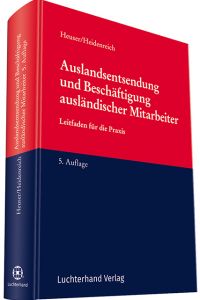4.1 The Importance of the Assignment Contract
With clear formulations against misunderstandings
The posting of an employee abroad is not covered by general management law. A longer stay abroad can therefore only take place on a new contractual basis. In addition, a posting abroad also creates a need for regulations in the areas of insurance and taxes. Many rules which are self-evident in a German employment relationship subject to social insurance contributions only apply under certain conditions when posting abroad. Contrary to the otherwise widespread use of Spartan standard contracts, I recommend enriching the secondment contract with clarifying information in order to avoid unnecessary questions and to create the necessary regulatory certainty. The secondment contract is a reference work for the expatriate in case of doubt. Especially in the area of remuneration, clear and unambiguous definitions are of great importance if subsequent and unproductive disputes are to be avoided.
4.2 The principles of contract design
Various design options
As a rule, the expatriate has an employment relationship with the sending domestic employer. In order to adapt the employment relationship to the conditions of a posting, there are essentially four options. Another option is ultimately to transfer the employee to a foreign company. Occasionally, the original domestic employment relationship with the employer is terminated and replaced by a secondment contract.
This secondment contract then regulates the domestic employment relationship as well as the questions of the foreign employment relationship. The advantage of this option is that there is ultimately only one single contractual text. The disadvantage is that this solution has the bitter aftertaste of a declaration of termination.
The same result can be achieved by a termination agreement. This design possibility has the advantage that there is only one single contract text without the disadvantage of the bitter aftertaste of a notice of termination. The question, however, is whether this procedure is also a sensible decision for the employee to be sent from a psychological point of view.
Interim agreement
In many cases, the original domestic employment relationship is passivated by a framework agreement. The suspension agreement suspends the main obligations arising from the employment relationship for a certain period of time with the proviso that they are to occur again after a certain key date or a certain period of time or a certain event. This option has the advantage for the employee that he or she is informed of his or her future fate after the end of his or her stay abroad due to the re-incorporation of the old conditions. For the sending employer, this regulation has the initially incalculable disadvantage that he must continue to employ the employee under the old conditions after the posting abroad.
Supplementary contract
The supplementary contract offers a further possibility of design, which is characterised by the fact that the domestic employment relationship is tailored to the special requirements of the assignment abroad and supplemented by the necessary and also necessary components. In this case, the need for adaptation must be analysed and coordinated particularly carefully. Here, too, it can be made clear that, for example, the special remuneration components are only to apply for the period of the secondment, because the supplementary agreement expires upon conclusion of the stay abroad and thus together with the special conditions for secondment. The advantage is that the employee knows after his or her stay abroad that he or she will continue to work at least under the original conditions of employment. Whether the employee's employment after a successful stay abroad is still appropriate on the basis of his or her original employment contract must be carefully considered. Alternative options are presented in the section on reintegration clauses.
The transfer is characterised by the fact that the conditions of the employment relationship in the host country are defined exclusively by the foreign employer. The employment relationship is now subject to a foreign employment contract statute.
While the works council must be consulted in the event of dismissal, the rights of participation in the other options are no longer applicable.
4.3 The corporate philosophy of the secondment / the connection to the head office
Employee appraisal brings clarity
The expatriate's contractual relationship between the employee to be seconded and the head office gives him or her the feeling that his or her existential questions are still in the familiar environment of his or her cultural circle. The questions and aspects related to the secondment should be carefully discussed and resolved in a staff meeting. In this way, the expatriate is provided with security which is of enormous importance for the fulfilment of his duties in the new host country.
Timely planning is required
In everyday practice, secondment contracts are sometimes only handed over in the airport lounge, so that the employee usually has no further and enforceable design options available. Although such an approach cannot always be avoided due to time constraints, timely consideration of the associated aftertaste should lead to prudent planning.
An important component of the corporate philosophy is also the fulfilment of the duty of care with regard to the design of the social security law for the employee. When an employee is posted abroad, numerous questions arise that can only be answered reliably by experts from the individual social insurance carriers. However, it is a consequence of the welfare principle that the employer informs his employee about the consequences of posting abroad in the area of social security law. Omissions or even contraventions through negligently researched questions lead to not inconsiderable liability.
Success through connection to the parent company
The connection to the head office during the foreign activity is the essential support for the successful execution of a task. In order to cope with the daily or at least regular communication with the parent company, the expatriate needs a permanent correspondence partner. In this way, the expatriate can first report on the progress made abroad and clarify the problem areas, while the parent company can inform him about internal changes and shifts in priorities. In this way, the work assignment in the host country is made more effective. Depending on the size of the company and the degree of diversification, a direct connection to the management is recommended.


